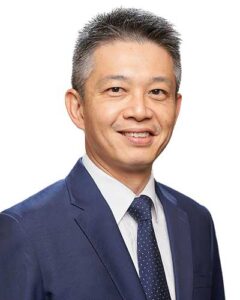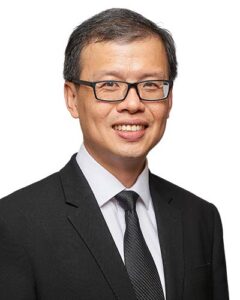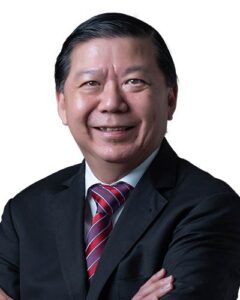Rajah & Tann Singapore has reshuffled its management team by appointing arbitration lawyers Ng Kim Beng and Kelvin Poon as joint deputy managing partners. The new heads will assist managing partner Patrick Ang, who took his second term in office, to lead the firm and its regional network as Asia recovers from the Covid crisis.

Ng and Poon succeeded Rebecca Chew, who now chairs the firm’s corporate social responsibility programme, the Rajah & Tann Foundation. The firm also named partners Sim Kwan Kiat, Tracy Ang, Vikna Rajah and Shuhei Otsuka as new members of the executive committee.
Talking about their top priorities in the coming year, Ng and Poon told Asia Business Law Journal that continuing to institutionalise the structure of the firm was crucial in enabling the new management to quickly adapt to their roles.
“Having that structure in place would be tremendously helpful in maintaining consistency and continuity in the transition process,” said Ng. “An ongoing initiative is to deploy secretarial staff into the practice-wide specialist roles to provide expert assistance for various professional support activities, such as file opening, conflicts management, meetings and travel planning.”
Poon added that equipping young lawyers with new skillsets has been a big part of the firm’s plan over the past year and would continue to be a main priority. .
“It’s an endless journey to equip and ensure that our young lawyers have a broad range of skills and experiences,” said Poon. “There is also a need for the younger lawyers to integrate more deeply with the network.”

Before the pandemic, Poon said that Rajah & Tann Singapore lawyers met regularly with lawyers from its regional network under Rajah & Tann Asia. The firm also initiated intra-firm secondment where lawyers worked with other leading law firms across the network, such as Christopher & Lee Ong in Kuala Lumpur, Assegaf Hamzah & Partners in Jakarta, Gatmaytan Yap Patacsil Gutierrez & Protacio in Manila, among others.The programme has been conducted virtually since the onset of the pandemic.
With social restrictions starting to be relaxed, the firm hopes to reinvigorate the intra-firm engagement to strengthen collaboration across jurisdictions.
Patrick Ang, who is also the vice-chairman of Rajah & Tann Asia, said regionalisation is a key strategy for the firm. To ensure that certain initiatives are adopted on the ground across jurisdictions, the firm has formed regional groupings along practice lines, such as groups for banking, international arbitration group, M&A, restructuring etc.

“We’ve also institutionalised our regional client relationships across the network, so we’re focusing not just on offering clients that come to us on an ad hoc basis, but we look at clients coming to us as a network,” said Ang. “If a client wants to do business in a few countries in Southeast Asia, we want them to use our network rather than use different firms and just use one of our member firms.”
Speaking on the anticipated practice areas for the coming year, Poon says international arbitration will always be in demand, in addition to data privacy and technology matters.
“Another area might be potentially environmental, social, and governance (ESG) because there are many concerns from Europe and the West,” said Poon. “Question marks on how we address those concerns in the developing markets like our region with different challenges, so it’s about helping our clients, skill up and level up.”
Ng added that as infrastructure has undergone a slowdown because of the social restrictions, real estate and construction activity would emerge and re-emerge. “In the legal services, we expect a lot more opportunity to provide support services for project finance through to the construction site.”
As more local, regional and international law firms expand their footprint in the region, along with with Asian companies investing more in in-house legal teams to reduce costs, Ang sees competition in the legal market as a positive sign.
“I think Singapore is a good example where competition from law firms has actually enhanced the deliverables and how law firms approach legal services,” said Ang.
Ang said the position of in-house counsel has become a more sought-after position among private practice lawyers compared to 30 years ago. Banks today tended to designate their loan negotiation and drafting internally instead of appointing law firms.
“Lawyers need to up their game to be involved in syndicate loans, or be involved in loan documents where there is a complex security, as well as well as cross-border elements where in-house counsel today still refer to us for those kinds of complex matters,” said Ang.


























